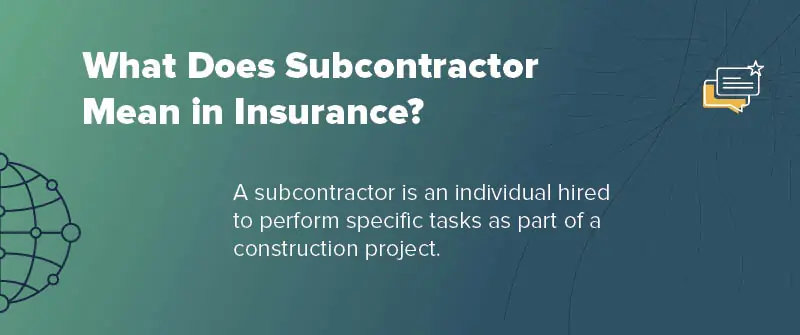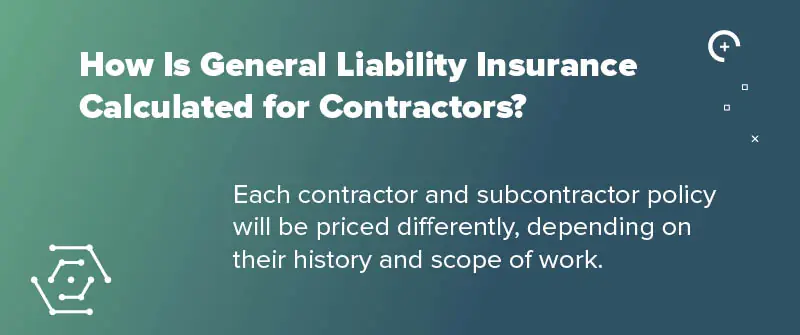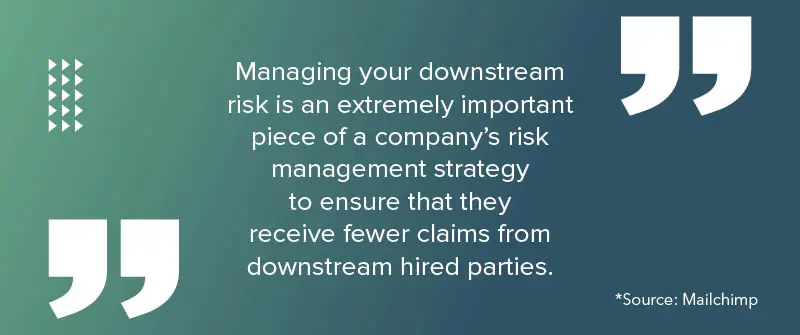
Risk is everywhere in construction—from physical objects that could hurt people or property to un- or underinsured subcontractors that threaten to bring costly claims and potential litigation your business’s way.
In this blog, we’re talking about the critical and heavily insurance-reliant industry of construction and specifically diving into subcontractor insurance requirements and verification. This includes workers’ compensation insurance, liability insurance, commercial auto insurance, and several other liability policy types.
Want to learn more about insurance verification? Follow along in our ongoing blog series, Certificates of Insurance 101, where we’re covering everything you need to know about COIs across industries, terms, documents, and more. myCOI has the expertise you need to master insurance compliance.
What Does Subcontractor Mean in Insurance?
A subcontractor is an individual hired to perform specific tasks as part of a construction project. Where primary (or general) contractors are often responsible for an overall project, a subcontractor’s responsibilities typically lie in specialized assistance for distinct portions of it.
Contractors and subcontractors are professionals who must gain an understanding of insurance if they want to be successful in their careers. That’s because their jobs, often surrounding construction, building, renovation, and specialized mechanical skills, are full of potential risks, and their clients will not want to hire an individual who is not properly prepared for them.
While subcontractors can hold many different kinds of insurance, a few types of contractor insurance one might consider holding include general liability, workers’ compensation insurance, and professional pollution coverage.

Types of Insurance for Subcontractors Explained
Understanding the variety of insurance that subcontractors might require is crucial for both subcontractors and the primary contractors hiring them. The construction industry faces unique risks, making it essential for subcontractors to carry insurance that not only meets legal requirements but also sufficiently covers the potential liabilities associated with their work. Here are the three typical types of insurance subcontractors need:
- General Liability Insurance: This foundational coverage protects against bodily injury, property damage, and personal injury claims. Given the physical nature of construction work, it’s a must-have for any subcontractor.
- Professional Liability Insurance (Errors and Omissions Insurance): Critical for subcontractors providing design or consulting services, covering claims related to professional errors or negligence.
- Workers’ Compensation Insurance: Required in most states for businesses with employees, this covers medical costs and lost wages for work-related injuries and illnesses.
- Professional Pollution Coverage: Offers protection against claims related to environmental damage caused by the subcontractor’s operations, such as releasing pollutants or hazardous waste. This coverage is essential for subcontractors involved in activities that could impact the environment, including construction, demolition, and waste management.
What Are the Three Different Types of Subcontractors?
We can generalize subcontractors into a few core groups based on the nature of their work and their relationship to a primary contractor. Here are three different types of subcontractors:
- Specialty Subcontractors: Specialty subcontractors are hired for their expertise in a specific trade or skill and handle specialized tasks within a larger project. Examples include electricians, plumbers, and HVAC specialists.
- General Subcontractors: General subcontractors take on broader responsibilities, often managing multiple aspects of a project and playing a more comprehensive role than specialty subcontractors.
- Independent Subcontractors: Independent subcontractors are businesses or individuals who operate independently and can take on a range of tasks within a project. They’re not directly employed by a primary contractor but hired separately to complete specific assignments and may bring their own team or resources.
Does My Subcontractor Need Insurance?
Subcontractors should carry their own insurance policy (general liability insurance, at the minimum), and if you’re hiring them, it is a best practice to make sure that they do.
Uninsured subcontractors bring with them the potential of uninsured liability claims on the job site down the line, such as medical payments or property damage. Ultimately, each party involved in a project wants to manage their own risk and shift liability exposure from themselves to an insurance provider so that they’re not stuck with the bill when likely on-the-job accidents occur. When hired subcontractors aren’t protected by insurance, the effects can ricochet onto your company, hitting your financials because you allowed both them and you to be exposed to risk. Ensuring that subcontractors have adequate insurance coverage helps manage the liabilities associated with their work.
So, to protect themselves and their businesses, primary contractors and other hiring parties typically request a business certificate of insurance from subcontractors. As we’ve discussed in other blogs, a certificate of insurance, or COI, is an important document in insurance verification because it provides a legal snapshot of someone’s policy. Issued by a policyholder’s insurer, COIs are the most common method that contractors and other vendors use to verify their third-party coverage.

Are Subcontractors Covered Under Contractors Insurance?
In some scenarios, subcontractors can be covered under a contractor’s insurance policy. Conversely, contractors can require an additional insured endorsement from a subcontractor in order to sign their contract, which would grant them coverage under that subcontractor’s policy. Contractors could also carry umbrella insurance, which provides additional liability coverage beyond the limits of their primary policies and can offer an extra layer of protection for subcontractors. Despite these scenarios, it is usually expected for subcontractors to carry their own insurance, including a liability insurance policy.
The specific insurance requirements a hiring company expects of its subcontractors are usually outlined in the contractual agreement between them, as well as in the COI request sent to the subcontractor to verify their coverage. It’s essential for contractors and subcontractors to define insurance responsibilities in their contracts to clearly a) ensure that there is adequate coverage for potential liabilities and b) clarify how insurance will respond in the case of incidents during the project.
How Is General Liability Insurance Calculated for Contractors?
Each contractor and subcontractor policy will be priced differently, depending on their history and scope of work. The cost of a general liability policy varies across individuals and is affected by various factors. Here are a few considerations that go into calculating general liability insurance for contractors and subcontractors:
- Type of work: The nature of the construction work is significant in its pricing. High-risk activities, such as roofing or demolition, may result in higher premiums due to increased potential for accidents and liability claims.
- Business size and revenue: Insurance companies often use a contractor’s annual revenue or payroll as a basis for determining premiums. Larger businesses with higher revenues or payrolls may face higher premiums.
- Coverage limits: Contractors and subcontractors can choose different coverage limits based on their needs. Higher coverage limits (aka more coverage) typically mean higher premiums.
- Previous claims: A contractor’s claims history is another key factor. If they have a history of frequent or severe claims, it may result in higher premiums.
- Experience: The qualifications of the contractor and their team may influence premiums. For example, experienced contractors with a strong safety record may be eligible for lower rates.

What Happens If My Subcontractor Does Not Have Insurance?
It is always advisable and often required for subcontractors to hold insurance. It follows that it’s also always highly recommended for anyone hiring subcontractors to verify that they have adequate insurance coverage to avoid costly consequences. Here are a few reasons why you should acquire proof of insurance from all hired subcontractors:
- Liability protection: Subcontractors are typically involved in tasks with a high risk of accidents or property damage. Liability insurance will help cover the costs associated with these incidents.
- Contractual requirements: Many contracts, especially in construction and other related industries, require subcontractors to carry specific types and amounts of insurance, ultimately helping protect both parties in agreements. Additionally, general contractors will often insist on insurance coverage as part of their contractual terms.
- Legal compliance: In some jurisdictions and industries, there may be legal requirements for subcontractors to carry certain types of insurance, with a failure to comply leading to legal ramifications.
- Professionalism: A subcontractor or other third party holding their own insurance demonstrates professionalism and financial responsibility, which can enhance their credibility in the eyes of clients and contractors.
- Risk management and allocation: Insurance helps distribute and manage risks effectively among various parties involved in a project and provides a financial safety net. Without it, subcontractors and, potentially, the hiring party could be exposed to significant financial risks in the case of accidents or injuries.
Is the Contractor or Subcontractor Responsible?
When claims come up surrounding subcontractor liability exposure, you might wonder who will be held responsible: the contractor or the subcontractor.
In insurance, we have a concept called downstream risk. It pertains to risks caused by those working under you that can ultimately bring negative consequences your way. Managing your downstream risk is an extremely important piece of a company’s risk management strategy to ensure that they receive fewer claims from downstream hired parties.
In addition to a subcontractor facing the consequences for accidents or damages their actions caused, the general contractor who hired them will also face legal liabilities if they did not take reasonable steps within their supervisory powers to ensure their subcontractor’s coverage.
Ultimately, if you don’t verify your subcontractors’ insurance, it will, at best, reflect poorly on you as a business and, at worst, bring severe legal and financial ramifications.

How Should I Verify My Subcontractors’ Insurance?
Unfortunately, we have heard too many firsthand accounts of times when subcontractors have lied about their insurance coverage, or workers have gone on with a job uninsured. It’s hard when it happens, but you should be smarter when working to protect your business. Let’s walk through the process for how to request, receive, and how to verify insurance coverage.
To start, you’ll want to prepare an official COI request letter. Open up a blank document or company letterhead and begin to lay out your insurance requirements for your subcontractor that will make it into the subcontractor insurance agreement. Include any details that you require of them, including policy type, minimum or maximum coverage limits, endorsements, etc. List specifically the name of the person you are looking to verify coverage from. Finally, include your company’s mailing address and your contact information so that they can list you as the certificate holder on the document and deliver it to you upon its issuance.
From there, the process lies with the subcontractor, who will go to their insurance provider to either verify that their current policy provides adequate coverage (and make changes to it if not) or to purchase a policy that does. It usually takes only a few days for insurance agents to generate a certificate, and once issued, it will be delivered to you to hold onto and verify.
What Is a Subcontractor for Insurance Purposes?
Let’s wrap up by recapping a bit of what we’ve covered today. Subcontractors are hired third-party workers who assist with construction jobs, often in a highly specialized way.
If you’re a general contractor or the party hiring them, you should do your due diligence and verify, for insurance purposes, that they have adequate coverage in place to mitigate the risk associated with them joining a job. If you don’t, you could be held financially liable for their mistakes.
To verify their coverage, you should send them a request for a COI or certificate of insurance, which will validate that they have adequate protection that meets your insurance requirements. Once you do so, you should be able to move forward with hiring that subcontractor for your job with peace of mind.
With myCOI, Managing Subcontractor Insurance Requirements and Compliance Is Simple
Learn how we help businesses like yours maintain their compliance, whether you’re hiring tens or hundreds of contractors and subcontractors. Book a free demo today.